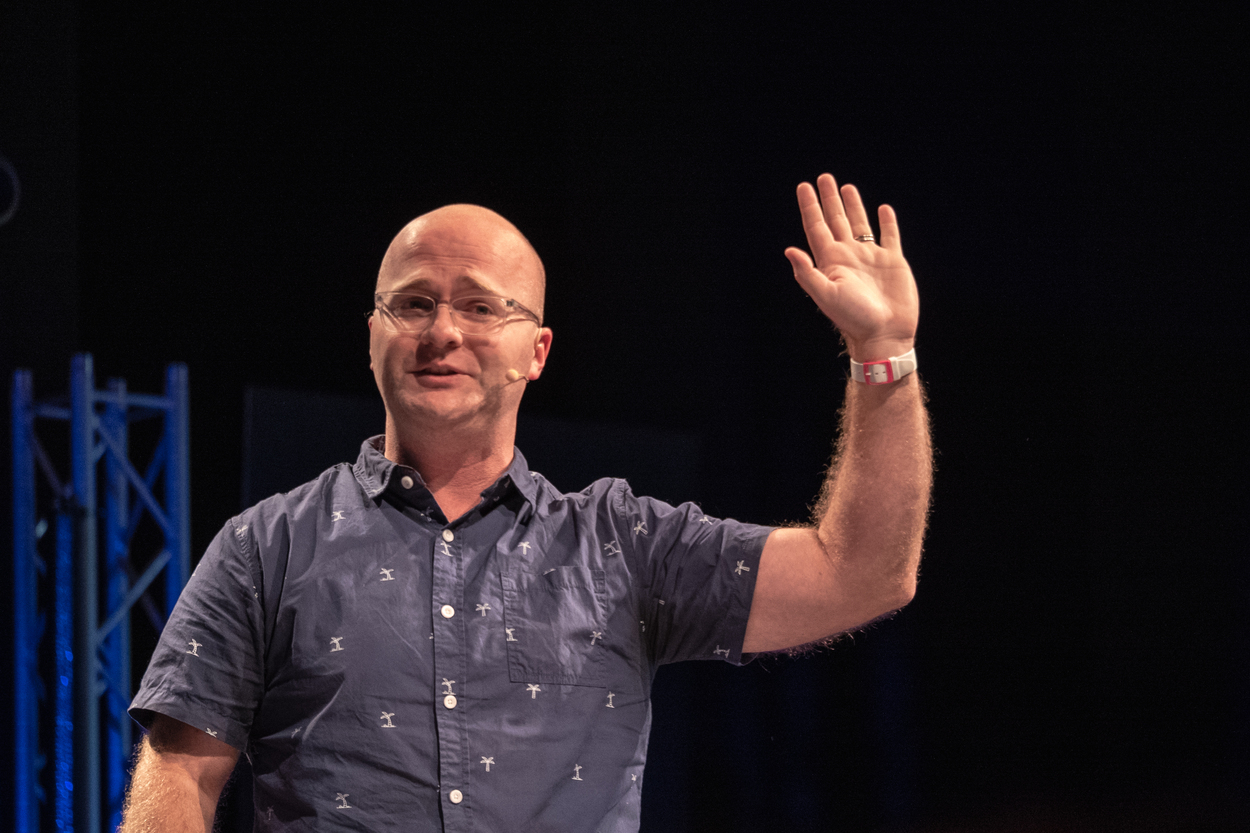
Rev. Adam Weber: Be real, point people to Jesus

Adam Weber at Embrace Church tells attendees at Reach to reach out to others authentically. Photos by Dave Stucke.
A couple months ago, Rev. Adam Weber went to an MMA fight that came to Sioux Falls. As someone who describes himself as “more of a lover than a fighter,” the lead pastor of multi-campus Embrace Church felt unsure about the experience. But he ultimately invited a friend and went because an MMA fighter had personally invited him. When Weber and his friend walked in, beer and testosterone were “flowing like water” and they turned to each other and debated whether they should even be there. The men’s hopes of flying under the radar were dashed when they discovered their seats were in the third row, and while walking to sit down, Weber was taken by surprise when person after person greeted him: “Hey Adam!” “Pastor!”
“Is our entire church here?” Weber remembers thinking. As soon as he was in his seat, a man next to him turned to him and said, “You’re my f***ing pastor!” The man added: “I gotta be honest with you: I hate church.” He explained that his wife had dragged him to Embrace and he’d actually been enjoying coming.
Despite the strange encounter, Weber found himself thanking God. “I was so grateful this guy could be his real self,” he said. The man didn’t turn into an angel like many people do with a pastor around.
And Weber realized in that moment: “This is exactly the place where I’m supposed to be.”
He also came to realize that what he himself experienced as a first-time visitor at that MMA fight mirrors what first-time visitors are yearning for when they come to church: “People are looking for the real deal,” he said.
In the final keynote address at Reach on Saturday afternoon, Weber shared three key ideas around what it means to reach authentically:
1. Know your “why.” We must ask ourselves why we’re trying to reach new people in the first place, Weber said. It’s not because we get paid to do it and it’s not because we need to save our church or denomination. “What’s our motivation?” said Weber. “Tell just one more person about Jesus…Tell them about the good news.” People need to know there’s a God who pulls us out of our muck, our worry, our anxiety.
“As pastors and leaders, people can sense when we’re spiritually dead,” Weber said. “People can sense when we’re going through the motions...People can tell when we’re just trying to keep a church alive.”
Weber said the woman at the well is one of his favorite stories in the Bible. “It starts with us remembering when God met us at the well,” he said. Just as the woman told her whole village about the man she met who knew everything about her, we have an opportunity and a responsibility to tell those in our lives about our God who knows everything about us—our darkness and our regret—and still loves us.

2. Be you—the real you: So often we put on a show and wear masks, Weber said. Jesus wants us to be ourselves. He recalls a pastor once telling him that he couldn’t wait to go on vacation so that he could put his hair down and be himself. “I’m so thankful I am part of a church where I can let my hair down all the time,” Weber said.
People want to be able to share the good, the bad, and the otherwise about themselves, their lives, and their struggles in following Jesus, Weber said. We can show people that it’s okay to be honest: “God, where are you? This hurts.” “This Bible verse makes no sense to me.” “I struggle with forgiving people.” “I struggle spending daily time with God.”
3. We need to connect Jesus to reality.“Jesus came to a specific time, a specific place, a specific people,” Weber said. “Jesus wants to do the same thing through all of us. We need to talk about the things people are actually wrestling with.”
What are people wrestling with? Weber named marriage, addiction, pornography, sex, drugs, purpose, prayer, how to follow God’s will, how to parent, regret, shame, bitterness, jealousy, and worry. We need to focus on the felt needs.
Doing that means considering first-time guests in all things, including the words we use in worship. Weber asked: What in your service do you just assume people know?
“So often, we say we have open doors and we speak in such a way that most people feel like complete outsiders,” Weber said. While he’s not suggesting that we change the depth of our messages in worship, he emphasized that they need to be delivered in such a way that they meet people right where they are.
The bottom line: “Our jobs as pastors, as leaders, as Christians is to point people to Jesus.”